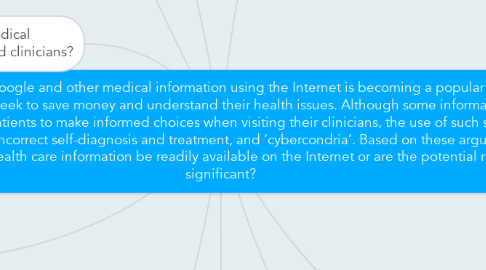Accessing Dr Google and other medical information using the Internet is becoming a popular trend as more patients seek to save money and understand their health issues. Although some information can help prepare patients to make informed choices when visiting their clinicians, the use of such sites may also result in incorrect self-diagnosis and treatment, and ‘cybercondria’. Based on these arguments, should such health care information be readily available on the Internet or are the potential risks too significant?
by Imogen Cain


1. Cons for Dr Google
1.1. No medical history stored/kept including previous medical conditions, prescriptions, family history, nationality etc...
1.2. Misdiagnosing:
1.2.1. from symptoms enter to website
1.2.2. Uncertified website
1.2.3. Common problem?
1.2.3.1. Data collection
1.3. Inability to gain rapport and trust
1.4. Unable to have visual on presenting problem including basic observation (heart rate, O2 levels, mental health state etc...)
2. Utilisation of online medical information by GP's and clinicians?
2.1. Rate of use by medical professionals
2.2. Dependent on: position, years of experience/in service, "internet savvy," ?
2.3. Only particular websites... which ones?
3. Medical advice on internet vs over the phone (HealthDirect) assistance
3.1. Literature to support
4. Are there websites which have been identified as not legible and been closed?
5. Evidence: MIMS ceased printing books for distribution due to ongoing continual updates to medicine - Now MIMS Online ongoing updated tool for clinicians/GP's
6. Pro for Dr Google:
6.1. No/little jargon/definitions provided
6.1.1. research: websites
6.1.2. Read discussion forums/feedback for good websites used by patients?
6.2. Quick access to up-to-date medicine from home / can make decisions on when to seek medical advice
6.2.1. How many stay at home parents vs full time workers utilise Dr Google? (Data collection)
6.2.2. Demographics: residential vs rural
6.3. Patients prepared for diagnosis when attending appts
6.3.1. Occasions documented by GP's of patients self-diagnosis
6.3.1.1. Percent of Correct?
6.3.1.2. Percent of incorrect?
6.4. Utilised by patients with conditions to embarrassed to attend clinic or hospital with?
6.4.1. Find: cases of patients not accessing GP for assistance due to condition
6.5. Inexpensive medical assistance assisting with:
6.5.1. Low income inearners
6.5.2. Saving time off work for appts
6.5.3. Transport expense
7. Bulk Billing (BB) GPs
7.1. Statistics for BB in areas based on socio-economic area??
7.2. How do patients perceive BB?
7.2.1. positive/negative feedback
